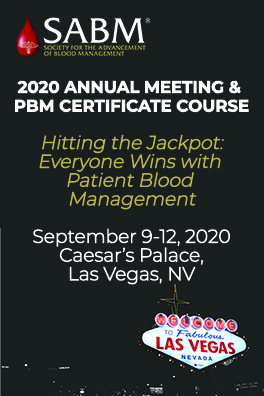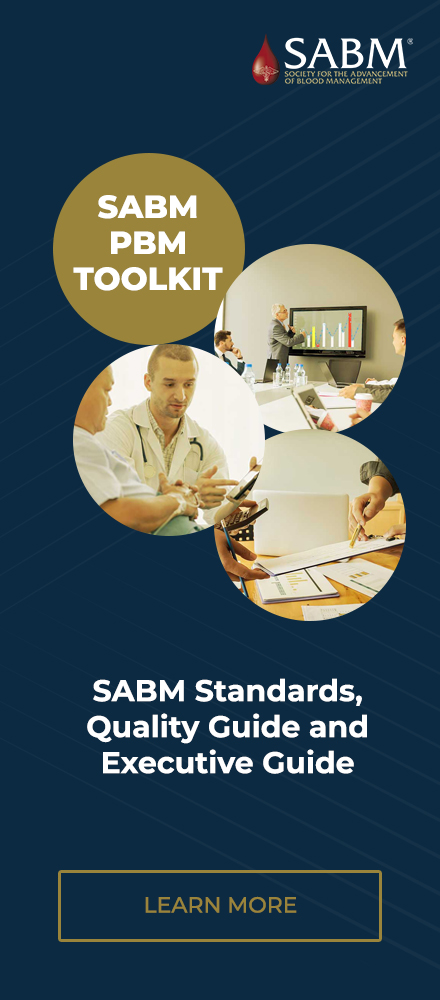MAY 2020
ISSUE

Please consider making a donation to your Society. Your donations will help us to improve the lives of people throughout the world through Patient Blood Management.
SABM 2020 Newsletter Publication
Editor: Kevin T. Wright
Associate Editor: Majed Refaai, MD
Contributors for This Issue
Christine Cahill, RN, MS
Ann Marie Gordon, PA-C, MLS (ASCP)
Beverly Khaek-On, BSN, RN
Mary Ann O'Brien, RN, MSN, CCRN, CNE
Sherri Ozawa, RN
Seth Perelman, MD, FASA
Majed Refaai, MD
Cassandra Upchurch, RN
Sarah Walbolt, BSN, RN
Kevin T. Wright
Marketing
Tim Bower, CAE
SABM Officers and
Directors
© 2020 Society for the Advancement of Blood Management
350 Engle Street Englewood, NJ 07631 USA Phone: (928) 551-6400 Fax: (877) 944-2272 EMAIL: [email protected] |
Members / Mentors
Mentorship Program Interview with Kelly Martin RN, BSN
Kelly Martin, RN, BSN is the Patient Blood Management Coordinator at St. Luke’s University Health Network in Bethlehem, Pennsylvania. Kelly has gained a vast amount of experience and knowledge in nursing her over twenty years in the field. She began her career with the American Red Cross, moved into learning more about care of cardiac patients, critical care and trauma patients which has prepared her well for her role in Quality and Safety as Patient Blood Management Coordinator in July of 2018.
I interviewed Kelly and asked her about her thoughts on SABM, SABM’s mentorship program, and her future goals as they relate to Patient Blood Management.
Mary Ann: What does Patient Blood Management (PBM) mean to you?
Kelly: Being able to provide evidence based, risk assessed information and treatment options to all patients for them to make informed decisions regarding their health care.
Mary Ann: How does SABM help you to achieve this?
Kelly: SABM keeps me informed of the newest initiatives and research in Patient Blood Management.
Mary Ann: How does membership in SABM help you in your practice?
Kelly: When I run into a snafu it provides a reliable resource to consult.
Mary Ann: Would you encourage other to participate in the SABM mentorship program?
Kelly: ABSOLUTELY! It is such a stress reliever to know that when I have a question, I can reach out to Mary Ann. She is so knowledgeable and always provides options to consider. She also lets me know when I am on the right path and encourages me to move ahead.
Mary Ann: What are your short and long term PBM goals?
Kelly: Goals:
- Set clear goals of the program
- Expand identification of anemia and develop treatment pathways to optimize patients who can be optimized and identify patients who need further work up or treatment.
- Explore implementing Bloodless Medicine Program options.
Mary Ann: Is there any information you would like to share?
Kelly: I was a patient care nurse with experience in Intensive Care /Trauma, and Cardiology for 26 years before I ventured into the role of Blood Management Coordinator for St. Luke’s University Health Network. I focus on 3 main areas: Patient Safety, Utilization, and the Bloodless Population.
Contributor: Mary Ann O’Brien RN, MSN, CCRN, CNE
PBM Perspective: The Clinical Challenge
In the world of medicine, healthcare providers are confronted with challenges every day in the goal of providing exceptional patient care. Medical practice has come a long way; however, many of the basic practices remain the same. Changing these conventional practices is often met with rigidity and apprehension. Patient Blood Management (PBM) techniques are considered a relatively new method in comparison to the conventional treatments using blood transfusions. Many healthcare professionals are still adapting to these new standards. Therefore, education and respect for the patient’s beliefs become vital aspects in providing a higher level of care. Religious beliefs and the personal choice to avoid transfusions are just two reasons why a patient requests bloodless medical or surgical care.
Even with this advancement in medicine, we still cannot duplicate the vital organ that is our blood. Patient refusal of blood transfusions in the hospital setting is often viewed as a barrier. Because of this, having a PBM coordinator is essential to remove these clinical hurdles and to provide an individualized plan of care.
As the Blood Conservation Coordinator for my facility, I am faced with making difficult recommendations because the patient has requested a plan of care that does not include blood transfusions. Clinically, we know that blood transfusions are meant to replace lost blood that is needed for bodily functions. In general, we are taught that transfusion treatment triggers are based on laboratory values but not necessarily dependent on patient’s symptoms and tolerance of anemia. Ultimately, our goal is to resolve the anemia promptly. Using conventional therapies such as blood transfusions provide a short term solution. However, resolving anemia needs to be a comprehensive strategy that incorporates diagnosis, treatment and prevention, which may include ongoing evaluation and treatment.
Consider for a moment that in a typical day multiple blood transfusions are routinely given. Patients are briefly informed of the risks and benefits though the long term repercussions remain uncertain and underestimated. Therefore, it is imperative to educate the patient adequately which includes managing their anemia and the long term risks associated with transfusions. Implementing blood management strategies early, before the anemia worsens, is essential to avoid unnecessary transfusions. More often than not, I am confronted with clinicians that prefer to follow the traditional treatment of transfusing the patient yet failing to consider the use of medications and/or therapies available.
For coordinators, it can be difficult to set aside our clinical perspectives and respect the religious beliefs of those who do not share our views. My specific challenge is to manage care between the patient and the clinical team by advocating for my patient, who requests to abstain from blood transfusions, but at the same time provide exceptional care.
Even with the advances in medical practice, our standard of care is still contingent on the patient’s request for restrictive treatments, including respecting those patients that wish to avoid transfusions not only for religious reasons but simply because they choose to.
Contributor: Beverly Khaek-On, BSN RN
|




Consider submitting your future manuscripts in PBM for peer review and publication in this new section. The success of this endeavor will depend on the provision of material to make it lively and attractive to our colleagues and other professionals in the field.
Members Invited to Submit Papers CLICK HERE
|